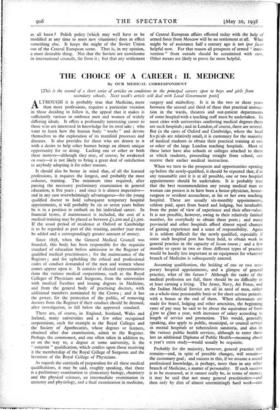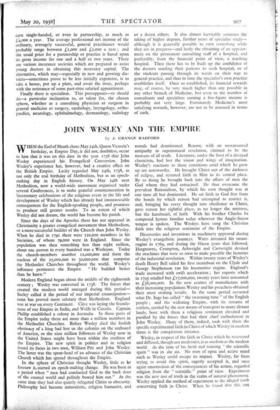THE CHOICE OF A CAREER : II. MEDICINE
By OUR MEDICAL CORRESPONDENT
[This is the second of a short series of articles on conditions in the principal careers open to .boys and girls from secondary schools. Next week's article will deal with Local Government posts] ALTHOUGH it is probably true that Medicine, more than most professions, requires a particular vocation in 'those deciding to follow it, the appeal that it makes is sufficiently various to embrace men and women of widely differing ideals. It offers a profoundly interesting career to those wao are interested in knowledge for its own- sake ; who want to learn how the human body " works " and devote themselves to the exploration of its manifold processes and diseases. It also provides for those who are drawn to it with a desire to help other human beings an almost unique opportunity for so doing. Lacking one or other or both these motives—although they may, of course, be awakened -en route—it is not likely to bring a great deal of satisfaction to anybody adopting it for .other reasons.
It should also be borne in mind that, of all the learned professions, it requires the longest, and probably the most arduous, training. The minimum time required, after passing the necessary preliminary examination in general education, is five years ; and since it is almost imperative— and in any case overwhelmingly advantageous—for the young qualified doctor to hold subsequent temporary hospital appointments, it will probably be six or seven years before he is in a position to embark on his individual career. In financial terms, if maintenance is included, the cost of a medical training may be placed as between £1,200 and £1,500. If the usual period of residence at Oxford or Cambridge is to be regarded as part of this training, another year must be added and a correspondingly greater amount of money.
Since 1858, when the General Medical Council was founded, this body has been responsible for the requisite standard of education before admission to the Register of qualified medical practitioners ; for the maintenance of the Register ; and for upholding the ethical and professional codes of conduct demanded of the men and women whose names appear upon it. It consists of elected representatives from the various medical corporations, such as the Royal Colleges of Physicians and Surgeons, from the universities with medical faculties and issuing degrees in Medicine, and from the general body of practising doctors, with additional members nominated by the Crown ; and it has the power, for the protection of the public, of removing doctors from the Register if their conduct should be deemed, after investigation, to fall below the approved standard.
There are, of course, in England, Scotland, Wales and Ireland, many universities and a few other recognised corporations, such for example as the Royal, Colleges and the Society of Apothecaries, whose degrees or licences, obtained after due examination, admit to the Register. Perhaps the commonest, and one often taken in addition to, or on the way to, a degree at some university, Is the " conjoint " qualification, which confers upon those receiving it the membership of the Royal College of Surgeons and the licentiate of the Royal College of Physicians.
As regards the curricula of preparation for all these medical qualifications, it may be said, roughly speaking, that there is a preliminary examination in elementary biology, chemistry and the physical sciences, an intermediate examination in anatomy and physiology, and a final examination in medicine, surgery and midwifery. It is in the two or three years between the second and third of these that practical instruc- tion in the wards, theatres and out-patient departments of some hospital with a teaching staff must be undertaken. In most cities with universities conferring medical degrees there are such hospitals ; and in London, of course, there are several. But in the cases of Oxford and Cambridge, where the local hospitals are relatively small, it is customary for the majority of medical students to obtain their practical training at one or other of the large London teaching hospitals. Most of these latter have also schools or colleges attached to them at which students, proceeding straight from school, can receive their earlier medical instruction.
When we turn to the prospects and opportunities opening up before the newly-qualified, it should be repeated that, if at any reasonable cost it is at all possible, one or two hospital appointments should be undertaken. It is probably true that the best recommendation any young medical man or woman can possess is to have been a house-physician, house- surgeon or resident accoucheur, at his or her own teaching hospital. These are usually six-monthly appointments, seldom paid, apart from board and lodging, but invaluable from the point of view of experience and their after-value. It is not possible, however, owing to their relatively limited number, for everybody to obtain these posts ; and many provincial and other hospitals afford almost equal chances of gaining experience and a sense of responsibility. Again it is seldom difficult for the newly qualified, especially if some such hospital post has been held, to obtain work in general practice in the capacity of locum tenens ; and a few months so spent in two or three different types of practice would be hardly less important as an equipment for whatever branch of Medicine is subsequently entered.
Assuming qualification, the holding of one or two tem- porary hospital appointments, and a glimpse of general practice, what of the future ? Although the ranks of the medical profession are full, there should be no difficulty in at least earning a living. The Army, Navy, Air Force, and the Indian Medical Service are all in need of men, either on a whole-time pensionable basis or for short service periods, with a bonus at the end of them. When allowances are made for board, lodging and other amenities, the beginning rates of pay may be said to be about the equivalent of from L50o to L600 a year, with increases of salary according to length of service and promotion. This would, generally speaking, also apply to public, municipal, or council service in mental hospitals or tuberculosis sanatoria, and also in the various public health services, although to enter these last an additional Diploma of Public Health—meaning about a year's extra study—would usually be requisite.
Probably for the majority, however, general practice still remains—and, in spite of possible changes, will remain— the customary goal.; and success in this, if we assume a sound professional knowledge, is perhaps, more than in any other branch of Medicine, a matter of personality. If such success is to be measured, as it cannot really be, in terms of money, it may be said that not many general prictitioners—and then only by dint of almoit unremittingly hard ivOrk—can earn single-handed, or even in partnership, as much as 1:4,000 a year. The average professional net income of the ordinary, averagely successful, general practitioner would probably range between Li,000 and £2,000 a year ; and the usual price for a partnership or practice is based upon its gross income for one and a half or two years. There are various insurance societies which are prepared to assist young doctors in obtaining this necessary capital. The alternative, which may—especially in new and growing dis- tricts—sometimes prove to be less initially expensive, is to take a house, put up a plate, and await the issue, perhaps with the assistance of some part-time salaried appointment.
Finally there is specialism. This presupposes—or should do—a particular inclination to, or talent for, the chosen sphere, whether as a consulting physician or surgeon in general medicine or surgery, cardiology, laryngology, ortho- paedics, neurology, ophthalmology, dermatology, radiology or a dozen others. It also almost inevitably connotes the taking of higher degrees, further years of specialist study— although it is generally possible to earn something while they are in progress—and lastly the obtaining of an appoint- ment on the permanent consulting staff of a hospital, and preferably, from the financial point of view, a teaching hospital. Then there has to be built up the confidence of the doctors sending their patients to such hospital, or of the students passing through its wards on their way to general practice, and thus in time the specialist's own practice establishes itself. Once so established, its financial rewards may, of course, be very much higher than any possible in any other branch of Medicine, but even so the number of consultants and specialists earning a five-figure income is probably not very large. Fortunately Medicine's most satisfying rewards, however, are not to be assessed in terms of cash.



















































 Previous page
Previous page